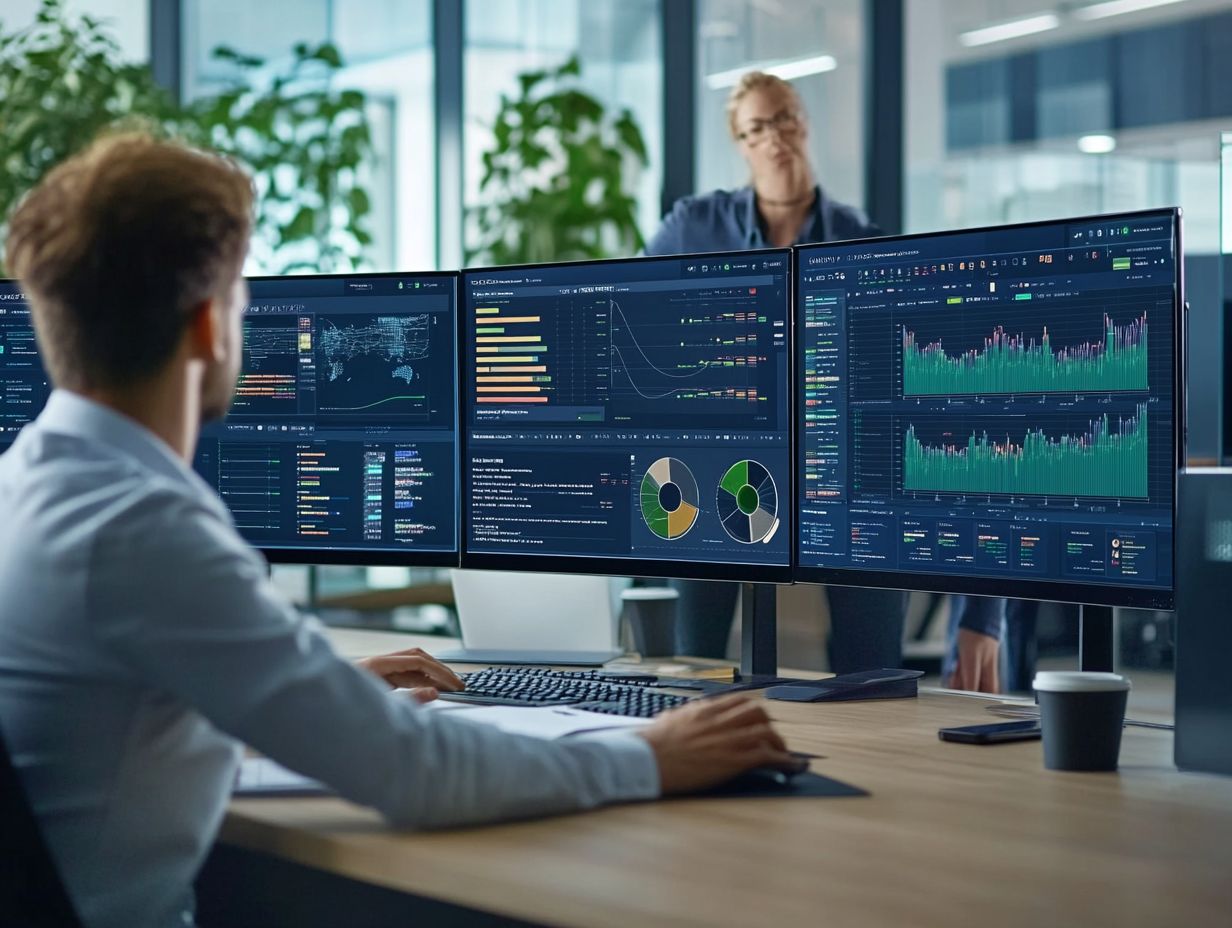the seamless integration of managed security services
In today’s digital landscape, the significance of robust cybersecurity measures is paramount. Managed Security Services (MSS) are essential for protecting your organization from evolving threats while enhancing operational efficiency.
This article will unveil the essentials of MSS. You will discover key components, factors that contribute to successful integration, and best practices to ensure your organization fully capitalizes on these services.
Prepare to elevate your cybersecurity strategy and stay ahead of threats!
Contents
- Key Takeaways:
- The Importance of Managed Security Services
- Benefits of Seamless Integration
- Key Components of Managed Security Services
- Factors to Consider for Seamless Integration
- Best Practices for Implementing Managed Security Services
- Frequently Asked Questions
- How does the seamless integration of managed security services benefit my business?
- What services are included in managed security services?
- How does this integration protect my company’s data?
- Can these services be tailored for my business?
- How do these services keep up with evolving cyber threats?
- What level of support is provided with these services?
Key Takeaways:

Seamless integration of managed security services streamlines processes, improving efficiency and effectiveness. Key components such as 24/7 monitoring and response, threat intelligence, and vulnerability management must be considered for successful integration. To understand what to expect from managed security services, effective communication, regular performance evaluation, and compatibility with existing systems are crucial for seamless integration.
The Importance of Managed Security Services
In today s digital landscape, you cannot overlook the significance of Managed Security Services (MSS) as you navigate an increasingly complex array of cybersecurity threats.
Managed Security Service Providers (MSSPs) are essential for safeguarding your sensitive data and ensuring compliance with industry regulations like GDPR and HIPAA. They deliver tailored security solutions that cater specifically to the needs of small to medium-sized businesses.
With cyberattacks becoming more sophisticated by the day, you should consider relying on external providers for advanced threat detection, continuous monitoring, and robust incident response plans to strengthen your security posture and protect your critical operational data.
Understanding the Role of Managed Security Services
The role of Managed Security Services (MSS) is to deliver comprehensive cybersecurity solutions tailored to enhance your organization s security posture. These services include threat detection, incident response, and ongoing risk management, providing you with the robust protection you require.
By harnessing advanced technologies, MSS focuses on proactive threat detection, identifying potential vulnerabilities before they can be exploited. This approach safeguards your systems and streamlines the management of Security Information and Event Management (SIEM), which refers to tools that help organizations detect and respond to security threats by analyzing security data.
By aggregating and analyzing security data from various sources, you gain a clearer picture of your organization s overall security health. Incident response capabilities empower you to swiftly address and mitigate breaches, ensuring that incidents are handled effectively and efficiently.
MSSPs integrate these functionalities seamlessly with your existing systems, enhancing your overall security framework and equipping you to navigate the ever-evolving landscape of cyber threats.
Benefits of Seamless Integration
Seamless integration of Managed Security Services with your existing systems is essential for enhancing your cybersecurity measures while maintaining operational efficiency, as detailed in understanding the scope of managed security services.
By leveraging advanced security technologies and tools, you can achieve comprehensive coverage tailored to your unique needs, especially in cloud-based operations.
This integration supports scalability and streamlines your security processes, enabling your business to respond swiftly to emerging threats.
Streamlining Security Processes
Streamlining security processes is essential for managing cybersecurity threats effectively and cultivating a resilient security environment.
To achieve this, consider implementing continuous monitoring systems that provide real-time visibility into your security posture.
Proactive threat detection technologies, enhanced by artificial intelligence and machine learning, empower you to identify and address potential vulnerabilities before they can be exploited.
Having a robust incident response plan is crucial as it outlines the necessary steps when a security breach occurs, ensuring swift recovery with minimal impact.
Regular vulnerability management practices, such as routine assessments and updates, are key to maintaining a strong security framework.
Together, these elements form a layered defense that significantly bolsters your overall cybersecurity resilience.
Enhancing Efficiency and Effectiveness

Enhancing the efficiency and effectiveness of your cybersecurity measures is crucial if you’re looking to mitigate risks while maintaining a robust security posture.
You can achieve this through proactive communication and coordination among various teams, ensuring everyone is aligned with your organization’s security objectives.
By sharing valuable insights and best practices, teams can swiftly adapt to emerging threats, fostering a more resilient security framework.
Implementing robust security awareness training and complete employee development programs is vital in cultivating a culture of security.
When your employees are well-informed about potential threats and best practices, they become the first line of defense. This contributes to a stronger collective effort in safeguarding sensitive information and minimizing vulnerabilities.
Key Components of Managed Security Services
The key components of Managed Security Services (MSS) are essential for delivering full cybersecurity coverage, ensuring that you are protected from threats at all times.
With these services in place, your organization can enjoy a strong defense against evolving risks, allowing you to focus on your core business operations with peace of mind.
24/7 Monitoring and Response
24/7 monitoring and incident response are the cornerstones of Managed Security Services, empowering you with the ability to detect and respond to threats in real-time.
These systems utilize advanced threat detection technologies, continuously analyzing network traffic and user behavior to spot anomalies that may signal a potential breach.
By automatically correlating data from diverse sources, you gain valuable insights into emerging threats before they escalate into significant problems.
The importance of rapid incident response can’t be overstated; even minimal delays in addressing security incidents can lead to serious consequences.
Swift action allows you to recover quickly and maintain operational integrity. This proactive approach protects your business continuity. It also strengthens your resilience against new cyber threats.
Threat Intelligence and Analysis
Threat intelligence and analysis are essential if you aim to proactively tackle potential security threats and enhance your data protection strategies.
By systematically examining patterns and indicators, you can gain valuable insights into emerging threats and trends, enabling you to fortify your defenses before issues arise.
In today s fast-paced cyber landscape, it s imperative to leverage advanced security tools that facilitate full threat analysis.
These tools not only help you identify vulnerabilities but also ensure compliance with industry regulations, providing structured support frameworks that align with best practices.
As a result, you can respond quickly to any incidents, creating a stronger work environment.
Vulnerability Management
Vulnerability management is an essential aspect of Managed Security Services, designed to help you identify, assess, and mitigate vulnerabilities to strengthen your organization’s security posture.
This comprehensive, multi-step process involves continuous monitoring, allowing you to prioritize threats based on their potential impact and implement the necessary remediation strategies.
By engaging in proactive threat detection, you can address security weaknesses before malicious actors have the opportunity to exploit them.
Effective vulnerability management serves as a cornerstone of overall risk management, helping you protect sensitive data and maintain business continuity.
Compliance management also strengthens this approach by ensuring your organization adheres to regulatory standards, safeguarding against legal repercussions and ultimately fostering trust with your stakeholders and clients.
Factors to Consider for Seamless Integration

When you contemplate integrating Managed Security Services with your existing systems, it’s important to consider the top benefits of managed security services in 2024 to ensure a seamless and effective transition.
Compatibility with Existing Systems
Ensuring compatibility with your existing systems is crucial if you’re looking to implement Managed Security Services (MSS) without encountering disruptions or vendor lock-in.
In today s landscape of digital transformation, evaluating how well new solutions will connect with your current infrastructure is essential. This often comprises a mix of legacy systems and modern platforms. System compatibility goes beyond mere functionality; it also involves critical aspects such as data privacy, ensuring that sensitive information remains secure throughout the integration process.
As you navigate the complexities of integration, be prepared for potential challenges. Data loss or inconsistencies may occur if your systems fail to communicate effectively.
Take inspiration from companies like Slack, which have successfully integrated with various CRM systems. They maintain data integrity and enhance performance, setting a benchmark for others on a similar path.
Scalability and Flexibility
Scalability and flexibility are crucial factors to consider when selecting MSS, particularly for small to medium-sized businesses that need adaptive security solutions.
As these businesses grow, they often encounter unique challenges that require a security framework capable of evolving alongside their operations. With advanced threats becoming increasingly sophisticated, having a security infrastructure that can expand effectively is essential. This ensures you don’t compromise on protection.
By tailoring security tools to meet your specific requirements, you enhance your defensive posture and optimize resource allocation. Prioritizing these aspects allows you to invest in solutions that address current vulnerabilities while anticipating future demands. This ensures a comprehensive and proactive approach to security management.
Best Practices for Implementing Managed Security Services
Implementing MSS effectively demands your commitment to best practices. These practices empower your organization to maximize its cybersecurity investments and elevate its overall security posture.
By adhering to these principles, you can ensure that every step you take not only fortifies your defenses but also optimally utilizes your resources for a robust security strategy.
Effective Communication and Collaboration
Effective communication is essential for implementing MSS. It ensures that every team member is aligned and informed.
To achieve this, prioritize creating an environment that encourages open dialogue. This approach allows for real-time updates and constructive feedback on security issues.
Regular meetings and collaborative tools can streamline information sharing among security teams. This makes the process even more efficient.
Incorporating security awareness training into your employee training programs is vital. It educates staff about potential threats and empowers them to take proactive measures in their response efforts.
A well-informed workforce plays a critical role in fostering a culture of security. This reinforces incident response plans and enhances overall resilience against cyber threats.
Regular Performance Evaluation and Updates

Regular performance evaluations and updates are vital for maintaining the effectiveness of MSS and ensuring compliance with industry standards.
These assessments help identify gaps in your security measures and provide valuable insights into the incident response plans you have in place.
By conducting thorough evaluations consistently, you can pinpoint vulnerabilities that malicious actors might exploit. Given the ever-evolving nature of cyber threats, you must adapt your security strategies to stay ahead of emerging risks!
Periodic updates allow you to implement cutting-edge technologies and techniques. This fortifies your organization s defenses and reassures stakeholders of your commitment to safeguarding sensitive information.
Frequently Asked Questions
Ready to enhance your security? Start evaluating your Managed Security Services today!
How does the seamless integration of managed security services benefit my business?
Managed security services offer a comprehensive and proactive approach to security. This integration helps in understanding managed security services for businesses, minimizing vulnerabilities and reducing the risk of breaches.
It also frees up your internal resources. A specialized team can then handle security, saving you time and money.
What services are included in managed security services?
These services generally include threat monitoring, vulnerability management, incident response, and compliance management. They can be customized to fit your business needs.
How does this integration protect my company’s data?
Managed security services use advanced technology to monitor and protect your data continuously. This includes real-time threat detection and regular vulnerability assessments.
Prompt incident response is also crucial to mitigate potential risks.
Can these services be tailored for my business?
Yes, they can be completely customized to address your specific security needs. This includes deciding on the level of monitoring and any compliance requirements.
How do these services keep up with evolving cyber threats?
Providers have dedicated teams that monitor and analyze emerging cyber threats. This enables them to take proactive measures before a threat escalates.
What level of support is provided with these services?
The level of support varies based on the services chosen. Most providers offer 24/7 support with dedicated teams ready to assist with security concerns.






